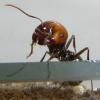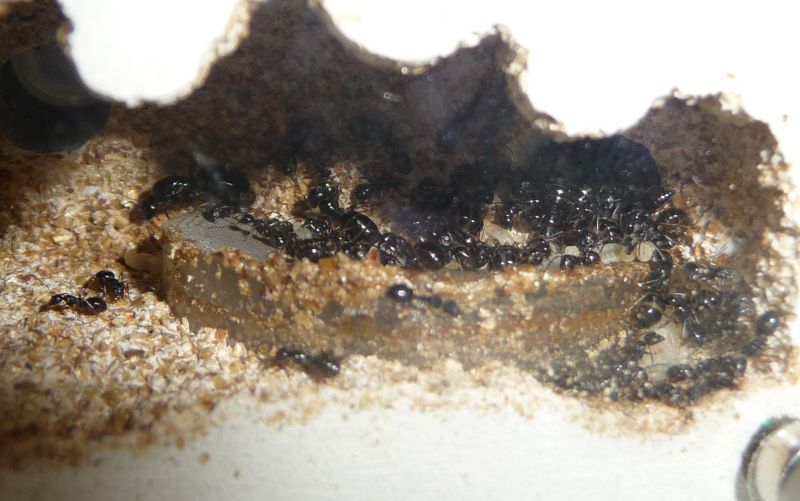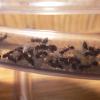- Formiculture.com
- Forums
- Gallery
- Members
- Member Map
- Chat

Camponotus piceus- Shiny black beauties!
Started By
Ernteameise
, Jun 21 2023 12:00 PM
140 replies to this topic
#121
 Offline
-
Posted September 7 2024 - 5:28 PM
Offline
-
Posted September 7 2024 - 5:28 PM
That is highly unfortunate. I think increasing ventilation is a good first step. If these are anything like the Camponotus here in America, I would advise against any more filling of the water tower in the nest. Just provide them drinking water in the outworld and let the nest part completely dry out. That should help eliminate the mold.
- rptraut, Ernteameise and Mushu like this
"The ants are a people not strong, yet they prepare their meat in the summer." Prov. 30:25
Keep ordinary ants in extraordinary ways.
Keep ordinary ants in extraordinary ways.
#122
 Offline
-
Posted September 8 2024 - 1:42 AM
Offline
-
Posted September 8 2024 - 1:42 AM
That is highly unfortunate. I think increasing ventilation is a good first step. If these are anything like the Camponotus here in America, I would advise against any more filling of the water tower in the nest. Just provide them drinking water in the outworld and let the nest part completely dry out. That should help eliminate the mold.
This is a good suggestion.
Yes, I have not refilled the water tower recently and was wondering.
The guy who sold them to me, however, said, that they have some of the nest with moisture, since these are ground nesting ants and not wood nesting ones.
I will try and see how I go.
They have plenty of drinking water.
#123
 Offline
-
Posted September 8 2024 - 6:30 AM
Offline
-
Posted September 8 2024 - 6:30 AM
I hope you get it solved. I will be following as this has the potential to effect all ant keepers, and knowing how to solve it is important.
- Ernteameise likes this
Go to the ant, you sluggard; consider its ways and be wise! It has no commander, no overseer or ruler, yet it stores its provisions in summer and gathers its food at harvest. -Proverbs 6: 6-8
My Ant Shop Here I have PPQ-526 permits to ship ants nationwide
Attention Ant-Keepers in South Dakota! Join the SoDak(Society Of Dakotan Ant Keepers)
#124
 Offline
-
Posted September 8 2024 - 7:28 AM
Offline
-
Posted September 8 2024 - 7:28 AM
I’ve often wondered how adding springtails to THA nests would go. They need quite a bit of moisture, though.
- Ernteameise likes this
"The ants are a people not strong, yet they prepare their meat in the summer." Prov. 30:25
Keep ordinary ants in extraordinary ways.
Keep ordinary ants in extraordinary ways.
#125
 Offline
-
Posted September 8 2024 - 11:00 AM
Offline
-
Posted September 8 2024 - 11:00 AM
I hope you get it solved. I will be following as this has the potential to effect all ant keepers, and knowing how to solve it is important.
Well, I will keep reporting.
I have checked the nest today, and at least one day after cleaning, I have not seen any further mould.
They also have transferred all the brood into the corner above the water tower to the opposite side of the mould area, and all the adults are sitting on the ceiling above the water tower, as far away from the mould area as possible.
We will see.
- Ants_Dakota likes this
#126
 Offline
-
Posted September 8 2024 - 11:03 AM
Offline
-
Posted September 8 2024 - 11:03 AM
I hope you get it solved. I will be following as this has the potential to effect all ant keepers, and knowing how to solve it is important.
Well, I will keep reporting.
I have checked the nest today, and at least one day after cleaning, I have not seen any further mould.
They also have transferred all the brood into the corner above the water tower to the opposite side of the mould area, and all the adults are sitting on the ceiling above the water tower, as far away from the mould area as possible.
We will see.
That may be because of the vinegar but who knows
- Ernteameise likes this
Go to the ant, you sluggard; consider its ways and be wise! It has no commander, no overseer or ruler, yet it stores its provisions in summer and gathers its food at harvest. -Proverbs 6: 6-8
My Ant Shop Here I have PPQ-526 permits to ship ants nationwide
Attention Ant-Keepers in South Dakota! Join the SoDak(Society Of Dakotan Ant Keepers)
#127
 Offline
-
Posted September 27 2024 - 5:12 AM
Offline
-
Posted September 27 2024 - 5:12 AM
The colony today.
The ants are still active, but the colony did grow much less than I had expected them this year. Probably due to the mold issue?
The mold issue also seems to have come under control, and no more mold is visible. The air supplied by the nest mate must have helped.
They do however still take some protein, I offered them a cricket today which they checked out.
They will be getting ready for slowing down during winter, since Camponotus are on an internal clock.

Edited by Ernteameise, September 27 2024 - 5:13 AM.
- Karma, RushmoreAnts, Full_Frontal_Yeti and 1 other like this
#128
 Offline
-
Posted October 1 2024 - 12:04 PM
Offline
-
Posted October 1 2024 - 12:04 PM
These girls still readily take protein.
The other colonies (apart from my one tropical species) have slowed down.

- Karma, RushmoreAnts and rptraut like this
#129
 Offline
-
Posted October 1 2024 - 12:08 PM
Offline
-
Posted October 1 2024 - 12:08 PM
Oh, and I still have not really observed any adverse reactions with the book lice in all my formicaria.
I see them scurrying around when I clean up, but they do not appear to actively harm any of the ants.
#130
 Offline
-
Posted October 1 2024 - 2:49 PM
Offline
-
Posted October 1 2024 - 2:49 PM
My Tetramorium immigrans colonies have abundant booklice in their setups. They are harmless from my experience, and simply feed off of scraps from the ants' trash pile.
- Ernteameise likes this
"God made..... all the creatures that move along the ground according to their kinds (including ants). And God saw that it was good. Genesis 1:25 NIV version
Keeping:
Formica cf. pallidefulva, cf. incerta, cf. argentea
Formica cf. aserva, cf. subintegra
Myrmica sp.
Lasius neoniger, brevicornis
#132
 Offline
-
Posted December 16 2024 - 10:08 AM
Offline
-
Posted December 16 2024 - 10:08 AM
Right, so these ants have been sitting in their nest for the past weeks and I have not seen any of them come out and I thought they were well and truly in their diapause phase.
However, this evening I had roast chicken for dinner, and I thought I would share with the girls.
This is what happened.
So there is still interest in protein, even if all larvae are in arrested development?

- rptraut likes this
#133
 Offline
-
Posted March 15 2025 - 5:26 AM
Offline
-
Posted March 15 2025 - 5:26 AM
I got these girls out of diapause today.
They seem to be doing well and sit on a small pile of brood.
At least the mold problem seems to be under control and appears to be gone.
From just one glance, I can see a difference between this species (Camponotus piceus) to my Camponotus lateralis colony:
While the Camponotus piceus are living with their brood on top of their water tower, the lateralis sit with their brood in the corner away from the water tower.
I think since lateralis is an arboreal species, they might need much less humidity.
After I got them back into the warmth, I also offered them a small piece of chicken, but so far, they have shown no interest.



- Full_Frontal_Yeti and Mushu like this
#134
 Offline
-
Posted March 16 2025 - 5:21 AM
Offline
-
Posted March 16 2025 - 5:21 AM
Well, a few larvae are in there.
There is to hope that this colony grows a little during 2025 (although this species will never form massive colonies and stay small).

- MyrmecologyMaven likes this
#135
 Offline
-
Posted March 16 2025 - 9:44 AM
Offline
-
Posted March 16 2025 - 9:44 AM
Danke für teilen! Der Glanz ist schön! Wie lange bis sich die Larven verpuppen?
#136
 Offline
-
Posted March 16 2025 - 10:54 AM
Offline
-
Posted March 16 2025 - 10:54 AM
Danke für teilen! Der Glanz ist schön! Wie lange bis sich die Larven verpuppen?
I think it is best to keep general conversation outside of personal messages in the original forum language to be more inclusive.
So I will stick to English here.
I actually do not know how long the period egg to adult ant is. Depends on temperature, I assume. Several weeks probably.
Plus, with Camponotus, during winter diapause, their larvae are in arrested development so will not develop for months.
They have been in that state since October.
Now with them back in the warmth, development will start up again.
Edited by Ernteameise, March 16 2025 - 11:03 AM.
- rptraut and MyrmecologyMaven like this
#137
 Offline
-
Posted March 16 2025 - 11:19 AM
Offline
-
Posted March 16 2025 - 11:19 AM
Danke für teilen! Der Glanz ist schön! Wie lange bis sich die Larven verpuppen?
I think it is best to keep general conversation outside of personal messages in the original forum language to be more inclusive.
So I will stick to English here.
I actually do not know how long the period egg to adult ant is. Depends on temperature, I assume. Several weeks probably.
Plus, with Camponotus, during winter diapause, their larvae are in arrested development so will not develop for months.
They have been in that state since October.
Now with them back in the warmth, development will start up again.
Got it! I've been studying German for a few hours a day for a while and have been getting kinda into it. I have been chatting with a few German people on other forums about my hobbies in German and like how I can read decently well. I'll stick to English on this forum!
Once the active period begins you can track a batch of eggs and see how long it takes.
I bet it'll be easy to track an egg batch with the small size of the colony.
I always find it cool how ants in dormancy keep the larvae in the same state for months. It's very interesting how the ants are able to coordinate food supply and brood care during dormancy. It makes me wonder how a large colony with thousands of workers is able to coordinate this. Pheromones are a complex language it seems!
- rptraut and Ernteameise like this
#138
 Offline
-
Posted March 16 2025 - 11:25 AM
Offline
-
Posted March 16 2025 - 11:25 AM
Danke für teilen! Der Glanz ist schön! Wie lange bis sich die Larven verpuppen?
I think it is best to keep general conversation outside of personal messages in the original forum language to be more inclusive.
So I will stick to English here.
I actually do not know how long the period egg to adult ant is. Depends on temperature, I assume. Several weeks probably.
Plus, with Camponotus, during winter diapause, their larvae are in arrested development so will not develop for months.
They have been in that state since October.
Now with them back in the warmth, development will start up again.
Got it! I've been studying German for a few hours a day for a while and have been getting kinda into it. I have been chatting with a few German people on other forums about my hobbies in German and like how I can read decently well. I'll stick to English on this forum!
Once the active period begins you can track a batch of eggs and see how long it takes.
I bet it'll be easy to track an egg batch with the small size of the colony.
I always find it cool how ants in dormancy keep the larvae in the same state for months. It's very interesting how the ants are able to coordinate food supply and brood care during dormancy. It makes me wonder how a large colony with thousands of workers is able to coordinate this. Pheromones are a complex language it seems!
In Camponotus, everything seems to be timed very precisely.
If you keep them too warm and feed them too well, the queen will finish her laying cycle before time and there might be issues, as well as if you do not cool them down and give them a chance to diapause. In the queen, hormones control her laying cycle and messing with the temperature can mess it up and even cause the colony to fail.
- rptraut and MyrmecologyMaven like this
#139
 Offline
-
Posted March 16 2025 - 11:59 AM
Offline
-
Posted March 16 2025 - 11:59 AM
Danke für teilen! Der Glanz ist schön! Wie lange bis sich die Larven verpuppen?
I think it is best to keep general conversation outside of personal messages in the original forum language to be more inclusive.
So I will stick to English here.
I actually do not know how long the period egg to adult ant is. Depends on temperature, I assume. Several weeks probably.
Plus, with Camponotus, during winter diapause, their larvae are in arrested development so will not develop for months.
They have been in that state since October.
Now with them back in the warmth, development will start up again.
Got it! I've been studying German for a few hours a day for a while and have been getting kinda into it. I have been chatting with a few German people on other forums about my hobbies in German and like how I can read decently well. I'll stick to English on this forum!
Once the active period begins you can track a batch of eggs and see how long it takes.
I bet it'll be easy to track an egg batch with the small size of the colony.
I always find it cool how ants in dormancy keep the larvae in the same state for months. It's very interesting how the ants are able to coordinate food supply and brood care during dormancy. It makes me wonder how a large colony with thousands of workers is able to coordinate this. Pheromones are a complex language it seems!
In Camponotus, everything seems to be timed very precisely.
If you keep them too warm and feed them too well, the queen will finish her laying cycle before time and there might be issues, as well as if you do not cool them down and give them a chance to diapause. In the queen, hormones control her laying cycle and messing with the temperature can mess it up and even cause the colony to fail.
Perhaps dud queens don't produce hormones as they should? I've had some queens from the same flight in the same setup with the exact same temperature never produce any more eggs beyond the first nanatic batch while other queens just explode in population. I suppose when a colony produces hundreds of alates it's more of a quantity over quality situation. In my early ant keeping days I experimented with dormancy in camponotus a little. I kept a few camponotus sp. colonies the same until winter. I put some in the fridge for diapause and others in a heated room. The ones in the heated room did do better in growth but then declined and never produced anymore eggs while the diapaused colonies all continued to develop as normal after dormancy.
- rptraut, Ernteameise and Mushu like this
#140
 Offline
-
Posted March 29 2025 - 2:36 AM
Offline
-
Posted March 29 2025 - 2:36 AM
I have been to the petstore yesterday and bought 3 fresh packs of life grasshoppers.
The girls are very happy with their offering of locust and came out in force.
Winter diapause is definitely over!

- ANTdrew, rptraut and Mushu like this
1 user(s) are reading this topic
0 members, 1 guests, 0 anonymous users



















